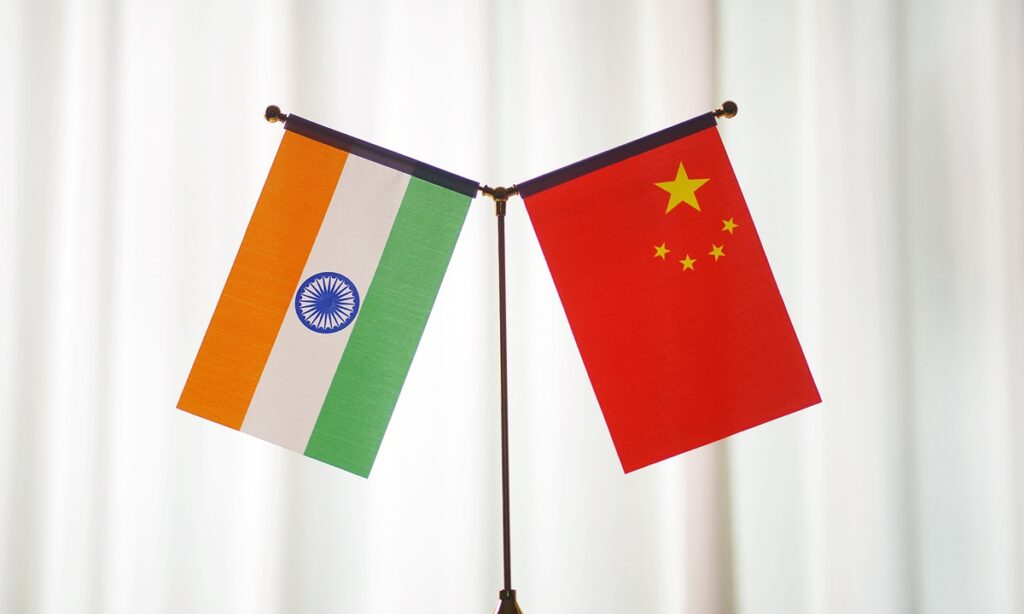New Delhi may find that US uncertain, ‘decoupling with China brings nothing good for India’s development’
Chinese President Xi Jinping met Wednesday with Indian Prime Minister Narendra Modi on the sidelines of the 16th BRICS Summit. Chinese analysts said the meeting has strategic significance as the recovery of China-India relations serves not only the interests of both countries, but also the multi-polarization of the world order.
During his meeting with Modi in Kazan, Russia, Xi urged China and India to facilitate each other’s pursuit of development aspirations. Xi said the two sides should strengthen communication and cooperation, properly manage differences and disagreements, the Xinhua News Agency reported.
This is the first bilateral meeting between the two leaders since 2019, when they met bilaterally in the southern Indian city of Chennai at the second informal India-China summit. The first informal meeting between the two leaders took place in Wuhan, Central China’s Hubei Province, in April 2018. In 2023, Xi also had talks with Modi on the sidelines of the BRICS Summit in South Africa at the latter’s request.
Lin Minwang, a deputy director of the Center for South Asian Studies at Fudan University, told the Global Times on Wednesday that the meeting shows that China-India relations are now on the track of recovery, as the two sides have reached resolutions on issues concerning the border area, so the obstacle that has blocked the recovery of bilateral ties has been removed.
“Over a recent period of time, China and India have reached resolutions on issues concerning the border area following close communication through diplomatic and military channels. China commends the progress made and will continue working with India for the sound implementation of these resolutions,” said Lin Jian, a spokesperson for the Chinese Foreign Ministry, said at a regular press conference on Tuesday.
Li Haidong, a professor at China Foreign Affairs University, told the Global Times on Wednesday that the meeting proves that this international organization formed by emerging economies is an important platform and channel for major countries to coordinate with each other on sensitive issues with diplomacy, to fix damaged ties and to reach consensus.
The world is entering a period of multi-polarization, and emerging economies like China and India are crucial players in this process, so if they can properly manage differences and boost mutual trust and unity, they could bring significant changes to improve or reform the international order that is facing the impact of Western-dominated unilateralism and US hegemony, Li noted.
Lin Minwang said that Indian policymakers and decision-makers have realized that they had made a mistake in the past four years in decoupling from China and trying to get support from the US, and now they need to correct this mistake.
“India’s policy that aims at decoupling from China has failed to attract meaningful support from the US-led West to help ‘Made in India’ and the country’s modernization and industrialization. This proves that India can’t profit from being hostile to or decoupling from China, and it is even making it difficult for India to realize its own development,” Lin Minwang said.
But this is just the economic reason, a key reason is that the Modi administration may have found that the US is very uncertain and unreliable, as US foreign policy may see a U-turn after the presidential election in November, so India must take action first to minimize the risks, experts said.
Li echoed that India’s concerns are not just caused by the US election, but also by the unhappy memories between India and the West in recent years. The Modi administration has found that the US and its allies cannot offer India much meaningful support, so now that India has tension with Canada, Washington will not side with New Delhi. This means that Modi may finally realize that it is unwise for India to completely side with the US in this game of great powers.
Hu Zhiyong, a research fellow with the Institute of International Relations at the Shanghai Academy of Social Sciences, told the Global Times on Wednesday that Modi is signaling that he wishes to stabilize and normalize India’s ties with China, but apart from issues over the border, there are still many uncertainties, challenges and problems.
Chinese experts are calling for India to facilitate people-to-people exchanges between the two countries and fix other relevant policies, so the Indian government can instill confidence and trust among Chinese firms and people that they can invest in India.
GT




